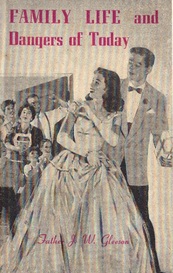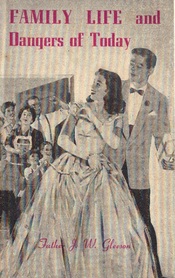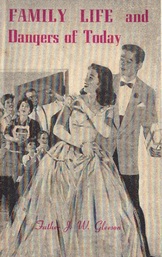
The Australian Catholic Truth Society Record
May 20, 1953 (No. 520)
Fr J W Gleeson
THE ADOLESCENT
Because of the special difficulties that many parents experience with their adolescent children, I think it is profitable to devote some attention to this particular age group.
With the onset of adolescence comes a period that is essentially one of trouble and of problems for the individual. Accordingly, it is usually a period of unrest and uncertainty. The reliability of things and of persons vanishes, not because these persons or things have become different, but because the adolescent's relations towards them have changed. This change of relations is due to the change in the individual himself, or rather, to the consciousness or awareness he has of himself. The happy unconsciousness of his early childhood is lost for ever. Within himself and in his personality, there are rapid changes going on. To him the world and the people in it present an ever-changing aspect.
Nobody can ever hope to understand the adolescent mind and even less to influence it somewhat, unless he is fully aware of the fact that uncertainty is the very basic feature of this age.
Yet we frequently meet with adults who judge the growing generation with impatience or even with harshness. They have left their own youth behind them, and distance lends enchantment to many things. They have forgotten that the frivolity, the heedlessness and the simple efforts towards adjusting themselves, which they now find so irritating in the adolescent, were equally galling to their elders when they were young.
THE MAIN PROBLEM
This brings me to the fact that we need to remember each individual who is growing up, and must not place all adolescents in one and the same mould.
The central phenomenon and the real problem of adolescence is the formation of the definite self. All other features and factors, such as sexual growth and awareness, are aspects of this one central process. One can never hope to attain a real understanding of the adolescent mind unless one fully acknowledges the central and fundamental importance of this process of formation and consolidation of self. This process is revealed in uncertainty, which becomes the very characteristic of adolescence.
The dawning consciousness that he is 'becoming a distinct person' makes the adolescent feel that he ought to be able to rely on himself, that he ought to be independent in his decisions, that he ought to become fully responsible for his actions. From this arises the longing for independence, a tendency for self-assurance, the unwillingness to listen to advice and the repugnance of blind obedience. In simpler and less dignified language, we see arise in these young people the "don't fence me in" attitude.
Little children in the average good home develop an unquestioning confidence in their parents. With adolescents, this attitude vanishes quickly and so it is important that the infantile attitudes of parents be replaced by ones adequate to the individual stages of development. This replacement often fails to take place on the part of the parents because they do not understand what is happening with their child. They do not notice, or very often, they do not want to know, that their child is no longer the little, helpless and implicitly trusting being he was but a few months before. They are shocked or disappointed to see the charming traits of childhood disappear.
WHAT PARENTS CAN DO
Instead of adjusting themselves to the new situation, instead of trying to understand this new personality of their child, parents often reproach him for things for which he should not be held responsible. Sometimes they try to treat him as if he were still a little child.
This is a most unhappy and dangerous situation. Parents should try to observe and follow carefully the gradual changes in their child and adjust their attitude and their measures to them. They should avoid all behaviour which undermines the original trusting love of the child. Their neglect in these matters may have no immediate effect, but impressions keep on rankling in some secret place in the child's mind and they become influential the very moment .problems arise within the child—problems which make confidence difficult, obedience loathsome, tenderness repulsive. Parents should be happy to be able to help their children to grow up, to be able to depend upon and to be able to control themselves.
Because of his uncertainty, the adolescent may not know what is really wrong with himself, or why he needs help, and even if he has some vague idea of these things, he frequently does not know how to express it because all his experiences are new and different. With the slowly growing consciousness of being a distinct
person, having to live his own life, the adolescent mind develops a natural reluctance to disclose itself. What makes the parents, who have been accustomed to the open-mindedness of the child, call the adolescent reticent, secret and impenetrable is, in truth, the first manifestation of a normal and even necessary quality of an adult mind. One may give to this quality the name of discretion, meaning the right discernment of things to be told and things to be withheld. The adolescent, because of his essential uncertainty, does not as yet know how to steer a middle course. Accordingly, he may be very outspoken one day and become utterly reticent the next. For this reason, it is well to make use of every opportunity he offers of getting to know him and his problems better. It will never do with adolescents to put them off, because we can never be sure that tomorrow they will be as willing to confide and to listen as they are today.
UNCERTAINTIES
This state of uncertainty to which I have referred is at the bottom of what is so often alluded to as the fickleness of the adolescents. They are fickle, no doubt; their interests change rapidly; they form friendships that do not last; they get enthusiastic about things that bore them soon afterwards; they are meek today and stubborn tomorrow, willing to work for a short spell and soon disgusted with everything concerned with work; they may be friendly, considerate and then cross, egotistic, impossible to approach. All these things and many similar things are true. But all the changes made, all the difficulties caused by them, all the trouble at school and at home, are but external signs of the inner uncertainty.
If you add to all this the question of the end of school days, the selection of the kind of work that they want, the new problems of work and environment, you can see that those who are responsible for adolescents are faced with a situation in which they must give tremendous help and never-ending sympathy and understanding.
It is well to mention here that much of the modern increased understanding of youth and of its problems fails to benefit the adolescent as it should because the one force, that can protect him and counteract the very dangers to which he is exposed, is invoked but very little and, in some quarters, it is not invoked at all. I mean the force of supernatural religion. It is a regrettable fact that much of the literature on adolescence is frankly naturalistic and materialistic. We must keep in mind the fact that in our Catholic Faith and in the sacramental helps supplied by it, we have the answer to our needs.
RELIGION IN THE HOME
Here again right attitudes are very important. In the home there must be respect for God, there must be prayer, must be talk about God and what God wants, and His goodness and His kindness, His Providence. Threats about God's punishments should not be necessary. God should be presented to the children as a loving Father, exemplified to the children in their own loving father and mother.
Religious practices will present problems in the home. Let us consider, e.g., the Rosary. This is long and tiring for little children, and if they get into an awful argument because they wriggle a little or if they giggle occasionally, they will start to dislike the Rosary. The same can happen if children are lined up for Confession and Communion on every possible occasion without their first being given the opportunity of deciding to receive the Sacraments of their own accord. This may particularly apply in the families of very devout parents. Perhaps later on the children will say, "I'm sick of religion. I'm finished with it."
Again, a danger is coming into the lives of these children from within the family itself not from neglect of religion, but from a mistaken attitude on the part of parents in the religious life of their children.
WITHIN THE HOME—A SUMMING UP
In the above pages you can see my reasons for stressing that the greatest dangers that can come to young people are frequently the dangers from within their own family. But, if the family is firmly grounded in the love of God, relying on His Providence, and the other points to which I have referred are remembered, it doesn't matter so much about the other dangers with which I shall now deal. The children will have the right approach and will be equipped and strengthened by their Faith and their family to face them.
Next....
II. OUTSIDE THE HOME








